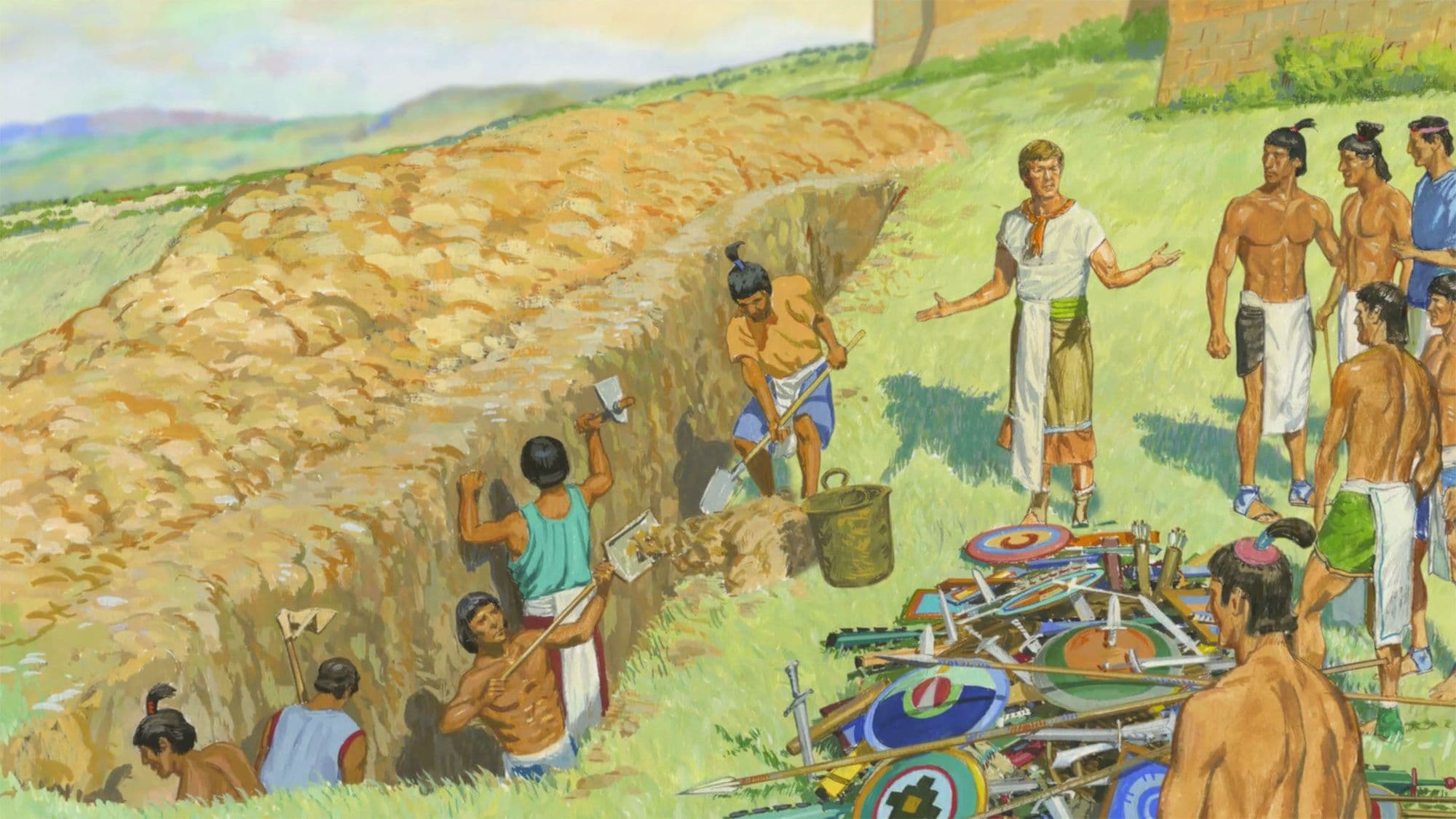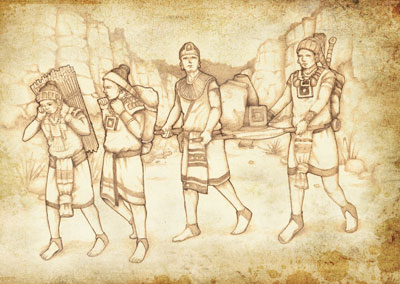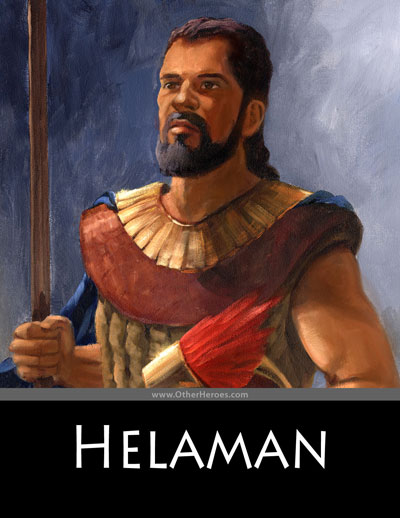KnoWhy #167 | August 27, 2020
How Did Helaman’s Army Maintain Faith While Being Cut Off from Provisions?
Post contributed by
Scripture Central

"But, behold … we trust God will deliver us, notwithstanding the weakness of our armies, yea, and deliver us out of the hands of our enemies." Alma 58:37
The Know
In his lengthy epistle to Moroni, Helaman reported that the Nephite armies on his front of the war had essentially reached a stalemate with the Lamanites (Alma 58:1–2). Helaman wrote that after sending “an embassy to the governor of our land, to acquaint him concerning the affairs of our people,” Helaman and his companions waited “to receive provisions and strength from the land of Zarahemla” (v. 4).
Yet while the Lamanites were “receiving great strength from day to day, and also many provisions” (Alma 58:5), the Nephites “did wait in these difficult circumstances for the space of many months, even until [they] were about to perish for the want of food” (v. 7). Eventually, they received food guarded by an “army of two thousand men,” but Helaman lamented that “this is all the assistance which we did receive … to contend with an enemy which was innumerable” (v. 8).
Prior to this time, Helaman’s young warriors had received many provisions from their fathers (see Alma 56:27), who were obligated to provide “a portion of their substance to assist” the Nephites in maintaining their armies (Alma 27:25), though those Ammonite men couldn’t fight themselves because of their covenant to never “use weapons again for the shedding of man’s blood” (Alma 24:18).1 Interestingly, what is known of supplying armies in ancient America provides a striking resemblance to this narrative. John L. Sorenson explained,
The logistics of maintaining a force in the field in Mesoamerica, either defensively or on the attack, was a serious challenge under ancient conditions. … Typically a supply of food was carried by soldiers on their backs from their home communities. … Supplies continually brought from the home base by a transport column were required or desirable.2
Similar to an ancient Mesoamerican environment, the Book of Mormon never mentions the use of animals for battle3 or even to haul war supplies.4 This likely indicates that the soldiers themselves had to carry heavy packs over long distances.5 Whether the fathers of the stripling warriors personally delivered these supplies, or whether they were simply dispatched by battle-capable Nephite warriors is ambiguous in the text.6 What is clear is that for some reason the transport of these essential provisions to the Nephite and Ammonite soldiers had either been halted or otherwise deterred.7
The Why
Because of their increasing lack of food and supplies, Helaman wrote, “we were grieved and also filled with fear, lest by any means the judgments of God should come upon our land, to our overthrow and utter destruction” (Alma 58:9). Rather than letting these fears sink them into utter despair, the high priest Helaman helped his young warriors maintain their faith through prayer: “Therefore we did pour out our souls in prayer to God, that he would strengthen us and deliver us” (v. 10). The Lord’s response brought them deep relief and peace:
Yea, and it came to pass that the Lord our God did visit us with assurances that he would deliver us; yea, insomuch that he did speak peace to our souls, and did grant unto us great faith, and did cause us that we should hope for our deliverance in him. (Alma 58:11)
At a time when they were temporarily cut off from needed food and military supplies, Helaman and his soldiers in balanced counterpoint received divine assurance that they were not cut off from the Lord’s miraculous blessings and deliverance. In response to their asking, they received the spiritual gifts of faith, hope, and comforting knowledge. Such a story can provide solace and hope to any who find themselves temporally destitute or in spiritual peril.
There is also a lesson to be found in the response of Helaman and his men to the Lord’s promised deliverance. Rather than idly waiting for God to provide for their needs, Helaman’s armies maintained their faith as they took the initiative and successfully executed a military strategy to take over a Lamanite stronghold. Helaman recorded, “And thus we did go forth with all our might against the Lamanites, who were in the city of Manti” (Alma 58:13). Elder D. Todd Christoffersen has taught, “Likewise, as we plead with God for our daily bread—for help in the moment that we cannot ourselves provide—we must still be active in doing and providing that which is within our power.”8
Eventually, readers learn that it was the corruption of government officials in the very center of Nephite territory that stalled provisions from reaching Helaman’s men (Alma 61:3–4).9 Similarly, the essential supply lines of faith, spiritual blessings, and gifts—often facilitated by inspired leaders and loving family members—can be impeded when the heart of the recipient becomes hardened or corrupt. Elder L. Whitney Clayton has taught:
The promises of the gospel are uplifting and ennobling, even exalting. We receive those promises by covenants which are conditioned on our living lives of purity and morality. When we live right and seek to purify our hearts, we draw closer to God and the Spirit. The condition of our heart determines how much evidence of divinity we see in the world now and qualifies us for the eventual realization of the promise that the pure “shall see God.” Ours is a quest for purity.10
Brant A. Gardner, Traditions of the Fathers: The Book of Mormon as History (Salt Lake City, UT: Greg Kofford Books, 2015), 311–320.
John L. Sorenson, Mormon’s Codex (Salt Lake City and Provo, UT: Deseret Book and Neal A. Maxwell Institute for Religious Scholarship, 2013), 381–425.
- 1. See Book of Mormon Central, “What Is the Symbolism of the Stained Swords of the Anti-Nephi-Lehies? (Alma 24:12),” KnoWhy 132 (June 29, 2016). Under Jewish law, those who were exempted from serving on the front lines of battle were still required to serve “in the rear: ‘They must furnish water and food and repair the roads;’” see John W. Welch, “Exemption from Military Duty,” in Reexploring the Book of Mormon: A Decade of New Research, ed. John W. Welch (Salt Lake City and Provo, UT: Deseret Book and FARMS, 1992), 191.
- 2. John L. Sorenson, Mormon’s Codex (Salt Lake City and Provo, UT: Deseret Book and Neal A. Maxwell Institute for Religious Scholarship, 2013), 419. For a more thorough treatment of logistics in Nephite warfare, see, John E. Kammeyer, The Nephite Art of War (Far West Publications at Smashword, 2012, Revised Edition 2014)” 72–80.
- 3. See Brant A. Gardner, Traditions of the Fathers: The Book of Mormon as History (Salt Lake City, UT: Greg Kofford Books, 2015), 294; See also, Book of Mormon Central, “What Is the Nature and Use of Chariots in the Book of Mormon? (Alma 18:9),” KnoWhy 126 (June 21, 2016). According to Kitty F. Emery, “A Zooarchaeological Test for Dietary Resource Depression at the End of the Classic Period in the Petexbatun, Guatemala,” Human Ecology 36, no. 5 (2008): 620, “the only domestic Maya animal during the classic period was the dog.” John L. Sorensen paints a much more complex and potentially expansive picture of animal domestication in ancient Mesoamerica, but in either case there seems to be no evidence of domesticated animals being used in a military context. See Sorenson, Mormon’s Codex, 309–321. See also Kammeyer, Nephite Art of War, 74–75.
- 4. See Ashley E. Sharpe and Kitty F. Emery, “Differential Animal Use within Three Late Classic Maya States: Implications for Politics and Trade,” Journal of Anthropological Archaeology 40 (2015): 287. Stanley Serafin, Carlos Peraza Lope, and Eunice Uc González, “Bioarchaeological Investigation of Ancient Maya Violence and Warfare in Inland Northwest Yucatan, Mexico,” American Journal of Physical Anthropology 154, no. (2014): 143; Gardner, Traditions of Fathers, 294; Kammeyer, Nephite Art of War, 72–74.
- 5. See Traci Ardren and Justin Lowry, “The Travels of Maya Merchants in the Ninth and Tenth Centuries AD: Investigations at Xuenkal and the Greater Cupul Province, Yucatan, Mexico,” World Archeology 43, no. 3 (2016): 429: “Both overland and sea transport relied upon human carriers; there were no domesticated pack animals in Classic times and depictions of ancient traders wearing heavy back racks full of items are known from elite pottery and native books.”
- 6. A biblical example of a family member personally carrying supplies to soldiers in the field can be seen in young David taking provisions to his brothers who were marshaled to war against the Philistines (1 Samuel 17:23). For a brief treatment of this narrative in the context of siege warfare, see Paul Bently Kern, Ancient Siege Warfare (Bloomington, IN: Indiana University Press, 1999), 36.
- 7. To consider general possibilities for the supply of Nephite armaments, see Kammeyer, Nephite Art of War, 75–80; William J. Hamblin and A. Brent Merrill, “Swords in the Book of Mormon,” in Warfare in the Book of Mormon, ed. Stephen D. Ricks and William J. Hamblin (Salt Lake City and Provo, UT: Deseret Book and FARMS, 1990), 329–351; Paul Y. Hoskisson, “Scimitars, Cimeters! We Have Scimitars! Do We Need Another Cimeter?,” in Warfare in the Book of Mormon, 352–359; William J. Hamblin and A. Brent Merrill, “Notes on the Cimeter (Scimitar) in the Book of Mormon,” in Warfare in the Book of Mormon, 360–364; William J. Hamblin, “The Bow and Arrow in the Book of Mormon,” in Warfare in the Book of Mormon, 365–399; William J. Hamblin, “Armor in the Book of Mormon,” in Warfare in the Book of Mormon, 400–424. It has been suggested by several scholars that Nephite weapons would likely have utilized obsidian for blades and arrow points. However, it seems that during battle these brittle, though very sharp, blades and points would have been prone to breakages and fractures, thus needing to be resupplied. See, for example, Marco Antonio Cervera Obregón, “The Macuahuitl: An Innovative Weapon of the Late Post-Classic in Mesoamerica,” Arms & Armour 3, no. 2 (2006): 145–146. For an argument that the macuahuitl (an ancient Mesoamerican club with inserts for obsidian blades) was in use during the Book of Mormon times, see Matthew Roper, “Swords and ‘Cimeters’ in the Book of Mormon,” Journal of Book of Mormon Studies 8, no. 1 (1999): 37–38. For general information about obsidian as an item of trade and industry in ancient Mesoamerica, see C. E. Ebert, M. Dennison, K. G. Hierth, S. B. McClure and D. J. Kennett, “Formative Period Obsidian Exchange Along the Pacific Coast of Mesoamerica,” Archaeometry 57, no. 1 (2015): 54–73; Barbara L. Stark, et al., “Economic growth in Mesoamerica: Obsidian consumption in the coastal lowlands,” Journal of Anthropological Archaeology, 41 (2016): 263-282.
- 8. D. Todd Christofferson, “Give Us This Day Our Daily Bread,” CES Fireside for Young Adults, delivered at Brigham Young University, January 9, 2011, accessed at lds.org.
- 9. See Book of Mormon Central, “Why Did Moroni Refer to Vessel Impurity in Condemning the Central Government? (Alma 60:23),” KnoWhy 169 (August 19, 2016).
- 10. L. Whitney Clayton, “Blessed Are All the Pure in Heart,” Ensign, November 2007, 52–53.

